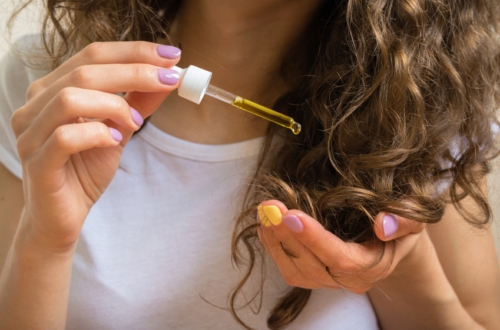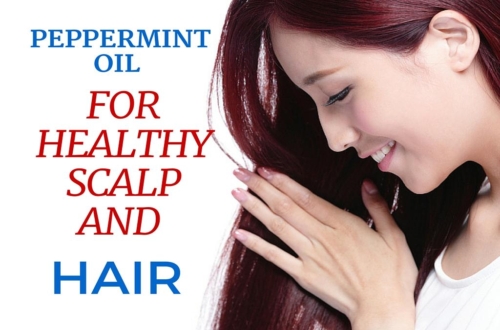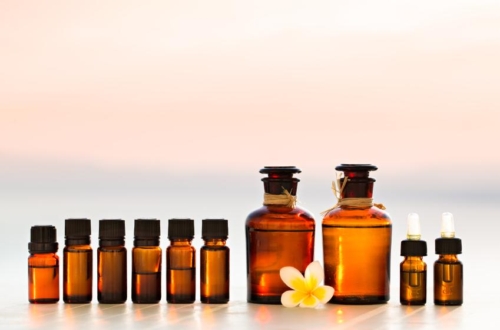 Essential oils are the concentrated “essence” of plants, extracted from many parts of the plant used, including the seed, trunk, leaf, fruit, and flower.
Essential oils are the concentrated “essence” of plants, extracted from many parts of the plant used, including the seed, trunk, leaf, fruit, and flower.
Each essential oil has a different chemical composition and has varied effects on the body, and peppermint is the queen of them all.
Peppermint oil is distilled from the leaves of the herb and is widely used around the world by traditional and alternative medical practitioners, and has some empirical evidence to back up its claims.
There are many uses for peppermint oil (1), some of will be explored further in this article. Essential oils provide some solutions to many physical and emotional ailments, and their use is gaining popularity.
10 Uses for Peppermint Oil
Peppermint (2), a cross between watermint and spearmint, can potentially relive muscle spasms, treat inflammation, relieve indigestion, help with nausea, and destroy bacteria, viruses, and parasites in the digestive tract. The scent alone when used in aromatherapy can ease headaches, stress, insomnia, and shock. Below are 10 peppermint essential oil uses (3).
1. Irritable Bowel Syndrome (IBS)

Peppermint oil for IBS (4) has become a new line of treatment against this disorder, which includes symptoms such as pain, bloating, gas, and diarrhea. Some studies have shown that enteric-coated peppermint capsules help treat the symptoms of IBS. The use of enteric-coated capsules is important, as the coating prevents the oil from being released in the stomach; if it did, it would cause heartburn and indigestion.
2. Headaches

Headaches are a nuisance and knowing that a time-trusted remedy to beat them exists is soothing for sufferers. Because peppermint oil improves circulation, it helps unconstrict blood vessels in the head thus allowing more blood to flow, which eases the headache.
For relief, use a tincture of 10% peppermint oil to 90% ethanol, and then lightly coat the forehead; allow the tincture to evaporate and soon you should feel relief. You can also apply two drops of oil to a small amount of carrier oil, mix, and then apply to the temple and back of the neck. Many companies prepare peppermint oil headache remedies that come in tiny roll-on glass containers so that you don’t have to fuss with creating your own every time you need it.
3. Gas and Bloating

Peppermint oil can be used as an alternative to pharmaceutical drugs meant to control gas and bloating and other issues associated with gastritis, like Buscopan. Add three drops of peppermint oil to hot water and drink. You can add honey and milk if you wish. If you’ve been prescribed a medication, however, don’t swap it out for oil without talking to your doctor first.
4. Healthy Scalp and Hair

If you think about it, you’re kind of already using peppermint oil for your hair, since many commercial shampoos have a minty scent or a cooling tingle to them. You don’t have to buy a special shampoo to benefit from the use of peppermint in your hair care regimen—add a few drops of the oil to your favorite shampoo and/or conditioner before using it and you can instantly reap the rewards of dandruff removal and a reduction in scalp irritation. And because it’s a stimulating oil, it may also encourage hair growth.
It may even help kill off lice because of its antiseptic properties. Add 10 drops of peppermint oil to a cup of olive oil, mix, and then apply all over your scalp. Wrap your hair in cling wrap and leave the mixture on for three hours; this will help kill any lice and lice eggs. Reapply every day until the lice are gone.
5. Stress and Depression

The menthol found in peppermint leaves, which then becomes distilled into a powerful oil, is a muscle relaxant and sedative. Peppermint oil can help the body and mind relax, and it may also help reduce blood pressure.
Peppermint oil is cooling and energizing. To de-stress before bed, add a few drops to a warm bath and soak in it for 15 minutes. You can also apply it directly to your wrists when feeling stressed and inhale a few times to benefit even more. You might also consider using a diffuser for the purposes of aromatherapy.
6. Respiratory Issues

Peppermint oil works as an effective expectorant and decongestant when you’re sick. Add a few drops to some coconut oil and then rub it on your chest. The scent will open your airways and act as a decongestant, and can help with asthma and bronchitis as well.
7. Skin Care

There are also peppermint oil uses for the skin. Hormonal skin problems such as persistent acne can continue into adulthood and can be difficult to treat, but a natural solution is possible with peppermint oil. Add a few drops of peppermint oil to coconut oil and then apply to the affected areas. Or you can rub it all over your face as a moisturizing treatment that will also combat acne.
8. Itch Relief

Peppermint oil can effectively stop the itching caused by bug bites, poison ivy, eczema, and dry skin. Some people can tolerate having the oil applied directly to the skin, but to be safe, mix a few drops with coconut oil or a carrier oil such as jojoba or almond. Apply the mixture to the itchy area a few times a day until the itching has subsided.
9. Natural Bug Repellant

Hiking? Try using peppermint oil as a natural bug repellant.
Many insects, including ticks, mosquitoes, and spiders, do not like the smell of peppermint. This makes it a great natural bug repellant against bugs because it doesn’t have the harsh chemicals other commercial repellants have, like DEET.
10. Soothe Sunburns

With summer around the corner, knowing a good and cheap way to soothe the pain of sunburns is essential. Add peppermint oil to water in a spray bottle and apply all over the affected skin. It will hydrate it and help ease the pain.
Precautions
In the same way that drugs made in laboratories have side effects, so do herbs, so their use needs to be administered with caution. If you are not comfortable self-administering herbs and the essential oils that come from them, please talk to a naturopathic doctor or another health care professional with knowledge of alternative medicine. Below are a few words of caution when it comes to the uses of peppermint oil.
- If you have gastroesophageal reflux disease or a hiatal hernia, do not take peppermint in any form. Talk to your doctor beforehand.
- During pregnancy, small amounts of peppermint might be OK to take internally via tea, but it’s best to discuss with a doctor if you want to take peppermint oil in larger doses, such as capsules. Not enough is known about the effects on pregnant women and fetuses to make this OK without the advice of a doctor.
- Do not apply peppermint oil directly on a child’s face or skin, nor should they ingest it. Talk to a doctor before administering in any way, unless it’s a weak peppermint tea (5) for indigestion, nausea, and nerves.
- For those who suffer from gallstones and gallbladder attacks, peppermint might increase the frequency of attacks and make gallstones worse (that is, larger). Use with caution and talk to your doctor first.
- If using peppermint oil internally, please make sure you are using the correct grade and type. Not every oil and tincture is meant for consumption. Read the labels and talk to someone knowledgeable before taking it, or any essential oil for that matter. Peppermint can be toxic in large doses or if the wrong solution is consumed, so it pays to be savvy.
- If applied directly to the skin it can cause a rash, so do a patch test first. Better yet, mix it with a carrier oil to soften the potency.
Read Next:
